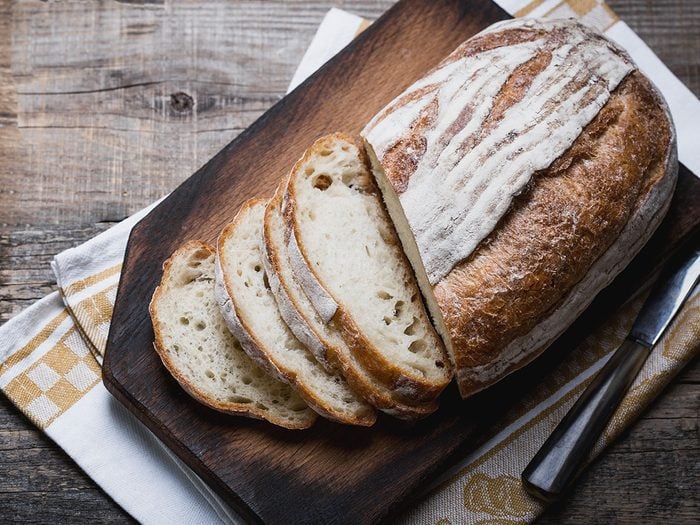
Your Next Quarantine Baking Project
You don’t have to visit the corner bakery for a good loaf of sourdough. It’s easier to make at home than you’d expect, especially when you use this Test Kitchen trick for simpler sourdough. The secret? Having the sourdough rise two different ways.
Traditional sourdough bread uses only sourdough starter culture, a natural yeast. It yields a rich flavour. But natural leavening is much fussier than commercial yeast. It takes more time. The temperature has to be just right, and so does your starter culture. Any glitches along the way and sourdough can turn out more like a brick than a bread loaf.
This recipe gives you the tangy flavour of sourdough starter plus the fast, reliable rise of active dry yeast. The result is two luscious loaves with light, airy crumb structure. Note: You’ll need to make the sourdough starter about a week before sourdough bread.
(Also, check out these other quarantine activities that can boost your wellbeing.)
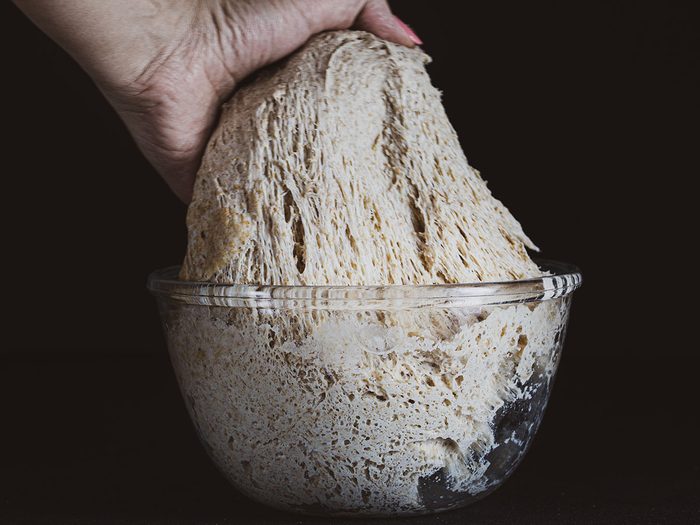
How to Make Easy Sourdough Bread
You’ll need:
- 2 packages (1/4 ounce each) active dry yeast
- 1-1/4 cups warm water (110° to 115°)
- 1 cup sourdough starter (ingredients and recipe in step 1), recently fed and roughly doubled in size
- 2 large eggs
- 1/4 cup sugar
- 1/4 cup vegetable oil
- 1 teaspoon salt
- 6 to 6-1/2 cups all-purpose flour, divided
- Melted butter
(Looking for a simpler bread recipe? Try Joanna Gaines’ 3-Minute Bread.)
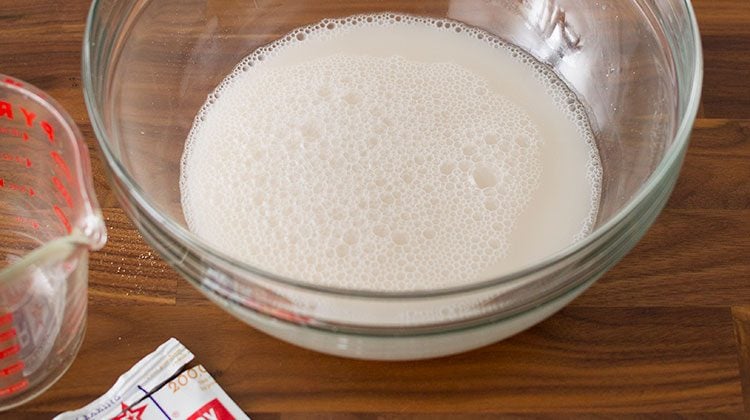
Step 1: Make a Sourdough Starter
You do have to plan a bit in advance to make a sourdough starter. Leave yourself about a week of lede time.
To make a starter at home, all you need is two cups of flour, a package of yeast and two cups of warm water. Mix the flour and yeast together in a four-quart glass or ceramic container, then gradually stir in the warm water—don’t go over 115ºF or you’ll kill the yeast. Cover this mix with a kitchen towel and let it sit in a warm place for two to four days. The mixture should be bubbly and smell sour.
Cover the starter tightly and pop it in the fridge. Be sure to feed it regularly—every day if kept at room temp or weekly if kept in the fridge.
(Also, try this recipe for healthy banana bread.)
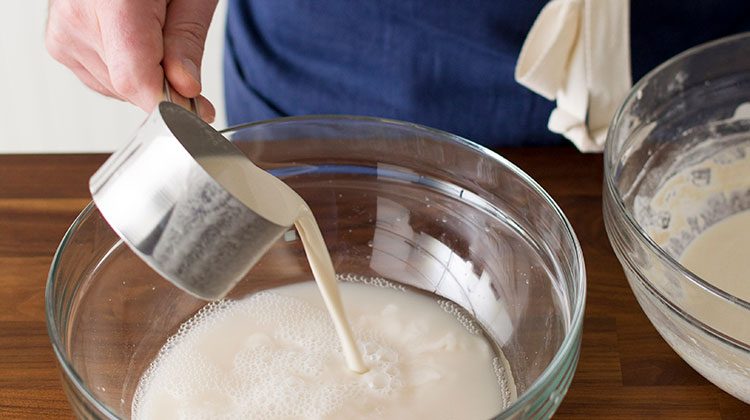
Step 2: Build Up Your Yeast
Once you’re ready to start baking, dissolve two packages of active dry yeast in warm water (again, the water shouldn’t be hotter than 115ºF or you will kill the yeast). Give this a quick whisk and add the sourdough starter. This should create a foamy, rich-smelling mixture.
Editor’s tip: This method of combining starter with yeast is what makes this sourdough bread so simple. It ensures that you get a great rise and that tasty sourdough flavour you crave.
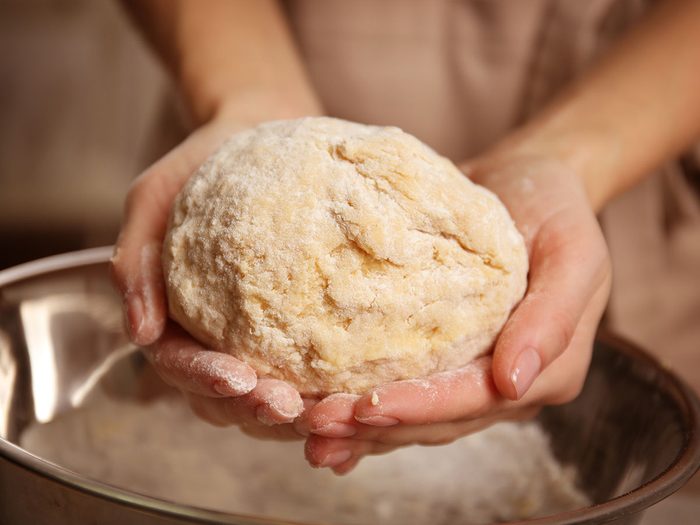
Step 3: Mix in the Rest of the Ingredients
Next, add in the eggs, sugar, oil, salt and three cups of flour and mix until smooth. You can do this by hand with a spoon, but a stand mixer makes this job much easier. Use the dough hook for best results.
When this mix has come together, add in the remaining flour to make a dough. The dough will be soft, but it will come together in the next step.

Step 4: Knead
Next, turn the dough out onto a floured surface and knead until smooth and elastic. This should take about eight minutes. If you want to save your workout for later, you can knead the dough in a stand mixer.
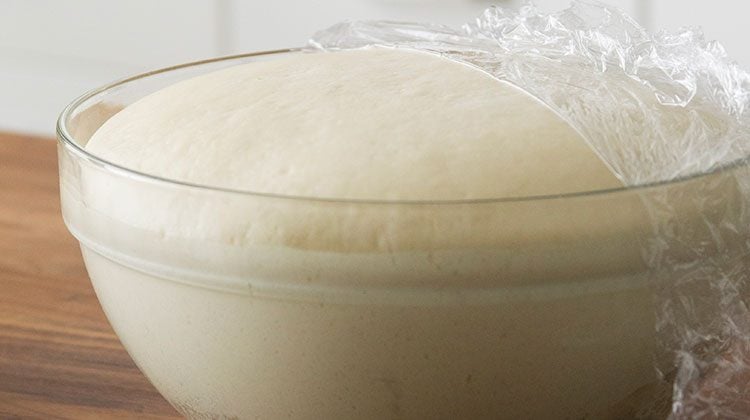
Step 5: Let Rise
Move the dough to a greased bowl (a quick spritz of cooking spray is all you need) and cover with a tea towel or plastic wrap. Let it rise in a warm place until doubled in size. This should take about an hour. You’ll know the bread has risen enough when you poke the dough, it springs back about halfway.
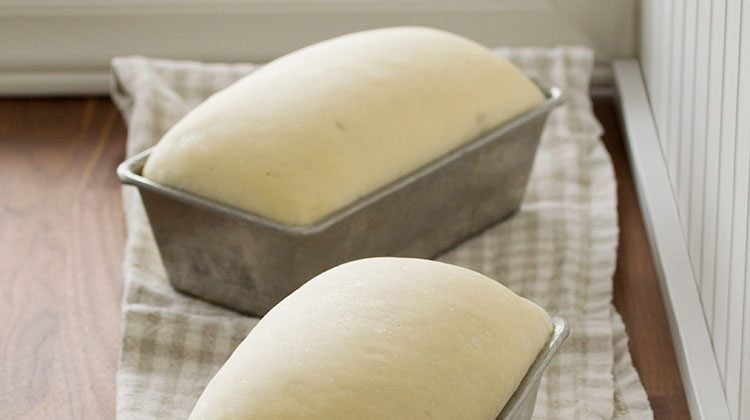
Step 6: Shape
Punch the risen dough down—this just means deflating the dough a bit by pressing down on it with your knuckles. It’s satisfying!
Lightly flour a surface and turn the dough onto it. Divide in half. With your palms, shape the dough into loaves. Place each in a greased 8×4-inch loaf pan and cover with a towel for the second proof. Like last time, let the dough proof in a warm, humid environment. After 45 minutes, your bread should have grown.
Editor’s tip: Preheat your oven to 375° toward the end of the rising so you can slide the dough in at peak height.
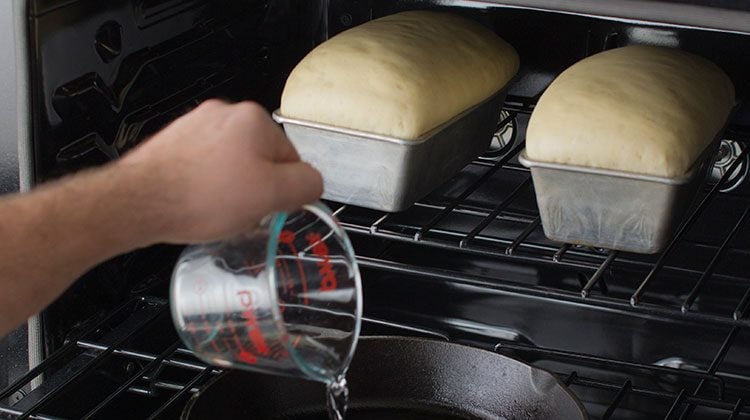
Step 7: Bake
Bake at 375° for 30-35 minutes, or until golden brown. For best results, bake the bread on the middle oven rack.
To get the best rise when the bread is put in the oven, place a cast-iron skillet or another oven-safe pan on the bottom rack as the oven preheats. After placing the bread on the rack above, carefully pour about 1/3 cup of water into the skillet. This will help to produce steam and create a moist environment, which will give the bread a better chance of rising to great heights and will help to brown the crust.
Editor’s tip: Your loaves should bake up in about a half-hour. To make sure they’re baked well, use a quick-read thermometer to check the internal temperature. Perfectly baked bread should be between 160 and 185ºF inside.
When the bread comes out of the oven, move to a wire rack to cool and brush the top with melted butter for extra rich flavour.
